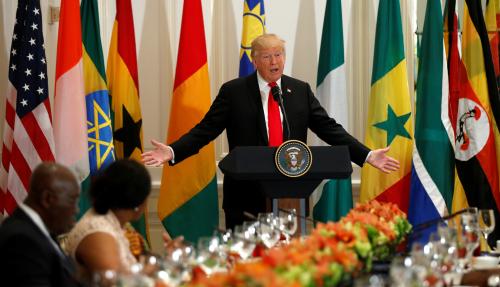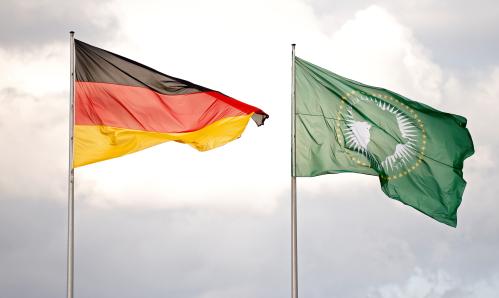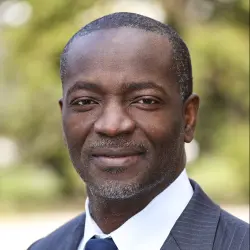This op-ed was originally published in French by Jeune Afrique.
At the eve of President Trump’s one-year anniversary, the administration’s strategy for Africa remains unclear. Early indications suggest that Africa is not a priority and the administration views the continent primarily through security lens, which was the dominant theme of the first conversations between Trump and the presidents of Nigeria, Kenya, and South Africa.
Subsequently, the administration deployed U.S. troops to counter al-Shabaab in East Africa and sold $593 million worth of military equipment to Nigeria. President Trump, Vice President Pence, or Secretary of State Tillerson has visited all regions of the world except Africa. The highest U.S. official’s visit to Africa was Defense Secretary Mattis’ trip to the U.S. military base in Djibouti. Trump’s first speech on Africa, at the United Nations in September, mentioned the continent’s potential as a viable economic partner. This statement contrasted the discouraging signals he sent last July by walking out during the Africa session of the G-20 Summit in Hamburg to take a bilateral meeting. If the administration’s Africa strategy is unclear, it is because there is not one yet. It would need to address two issues in the formulation of its future Africa strategy: What to do about the Africa programs of his predecessors, and what new Africa agenda, if any, to initiate for his own legacy?
The most visible U.S.-Africa programs include the African Growth and Opportunity Act (AGOA), first signed under President Clinton in 2000, which marked an important attempt to graduate U.S.-Africa relations from donor-recipient toward a trade partnership. President Bush pushed for more humanitarian assistance to Africa, notably through his Emerging Plan for AIDS Relief (PEPFAR). President Obama’s programs included the Young African Leaders Initiative as well as the Power Africa. The fate of most of these programs remains unclear. They have received strong support from Republicans and Democrats, and their termination would reflect a choice by the executive branch rather than discourse in Congress.
Trump’s proposed budget to Congress provided an opportunity to assess his foreign policy strategy more broadly. It recommends 28 percent funding cuts for the Department of State and USAID, and an elimination of funding for the Emergency Refugee and Migration Assistance. It preserves PEPFAR but reduces its funding by 17 percent. Total cuts for Africa-related programs would amount to 13 percent. Assistance to other regions outside of Africa would also be curtailed. Pulling the U.S. from the Paris Agreement will affect Africa, a region most exposed to climate change despite contributing to it the least. In contrast, the budget for the Department of Defense would increase by 10 percent. These proposals and actions reflect President Trump’s preference for hard power or military might over soft power based on development assistance and diplomacy, and his belief in transactional bilateral relationships over multilateralism.
In the formulation of an Africa strategy, the administration should not downplay the continent as a viable economic partner. About half of the world’s ten fastest growing economies are in Africa, with two-third of the economies projected to expand at a faster rate than the global economy. The continent’s middle class is growing rapidly and consumer and business spending are projected rise at an annual rate of 3-4 percent through 2025. Moreover, the continent’s large infrastructure gap presents opportunities for U.S. companies. The energy and entrepreneurial spirit of women and young people is also a vital asset. A failure to recognize this dynamism and to engage the continent proactively will see U.S. cede more ground in Africa to other partners such as Europe or China. Even if security is the primary motivation for the administration’s interest in Africa, it would be misguided to think that military solutions are the only, or even the best or cost effective, solutions to security problems. Development, diplomacy, and defense, are intertwined in more ways than meets the eye.
It is not uncommon for U.S. presidents to take office without a clear Africa agenda. Former Presidents Clinton and Bush did not reveal an Africa agenda until well into their first terms. Similarly, President Obama’s strategy for sub-Saharan Africa was not published until June 2012. Nonetheless, these former presidents left overall positive Africa legacies for Trump to build upon. There is still time for Trump to build his own positive legacy. The mid-November gathering of African Foreign Ministers at the Department of State to discuss trade, governance, and security, was a step in the right direction. However, the administration still needs to fill important policy positions, including that of assistant secretary of state for Africa. The unique difficulties of this administration in gaining traction on the domestic agenda as well as a plan to revisit U.S. relations with several important U.S. partners suggest that Africa will remain on the backburner for now.
The Brookings Institution is committed to quality, independence, and impact.
We are supported by a diverse array of funders. In line with our values and policies, each Brookings publication represents the sole views of its author(s).






Commentary
Op-edThe Trump administration and Africa
January 2, 2018